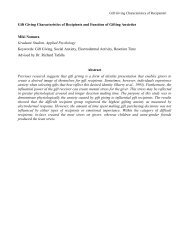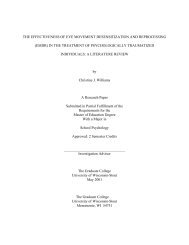Comics Aren't Just For Fun Anymore: The Practical Use of Comics ...
Comics Aren't Just For Fun Anymore: The Practical Use of Comics ...
Comics Aren't Just For Fun Anymore: The Practical Use of Comics ...
Create successful ePaper yourself
Turn your PDF publications into a flip-book with our unique Google optimized e-Paper software.
Recine 44<br />
3. Current <strong>Use</strong> <strong>of</strong> <strong>Comics</strong> by ESL/EFL Learners and TESOL Pr<strong>of</strong>essionals<br />
3.1. <strong>Comics</strong> and Global, Cross-Cultural Communication<br />
“Our real education begins outside the classroom with the joy <strong>of</strong> discovery,” writes the<br />
journalist Paddy Wordworth (“Our Real Education”). When it comes to learning about other language<br />
and cultures, Wordworth’s words are especially true <strong>of</strong> comics, due to their cross-cultural, worldwide<br />
popularity, a popularity that permeates the classroom and extends far beyond it. <strong>The</strong> French comic book<br />
series Asterix has been translated into 107 languages (“Translations”). Tintin, a popular Belgian comic<br />
book series, is also available in more than 100 languages (“<strong>Fun</strong> Facts”). Similarly, Disney Publishing<br />
International states that its comics are “printed across 85 countries in more than 75 languages,” and that<br />
its company is “the largest publisher <strong>of</strong> children's comics (excluding manga)” (Levine 1). By Disney’s<br />
own admission, Japanese comics, also known as “manga,” maintain an even larger global presence than<br />
Disney’s own impressively popular lineup (Levine 1). Internationally popular comics in turn are tied to<br />
other globally distributed media products. Movies featuring comic book characters such as Batman,<br />
Spider-Man, Superman, <strong>The</strong> Avengers, and so on are global box <strong>of</strong>fice hits. Similarly, popular animated<br />
television shows such as <strong>The</strong> Simpsons and Spongebob Squarepants appear in many countries, along<br />
with their licensed comics.<br />
Clearly, comics are associated with a number <strong>of</strong> internationally recognizable stories and<br />
characters. It is perhaps for this reason that the comics medium itself is a highly recognizable,<br />
commonly seen form <strong>of</strong> mass media the world around. Moreover, unlike their visual cousins,<br />
television, movies, and video games, comics can be disseminated to classrooms and other settings with<br />
little or no technology or infrastructure, as I mentioned in section 1 <strong>of</strong> this paper. <strong>The</strong> iconic nature <strong>of</strong><br />
comics, combined with their ease <strong>of</strong> production and distribution, make the art form ideal for the sharing<br />
<strong>of</strong> ideas and knowledge across international borders and cultural boundaries. This kind <strong>of</strong> sharing is
















